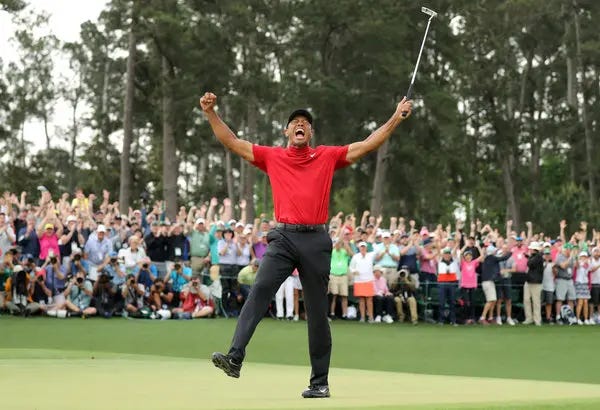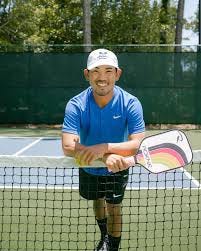Why No Gay Golfers Will Tee Up This Week at The Masters
The Likely Reason Does Not Fit the Left's Agenda
On Thursday, 96 golfers will tee up at the Masters. According to Outsports, this will be the 87th consecutive Masters Golf Tournament without an openly gay player.
As to why this is so, Google AI, an aggregator of accepted wisdom, has a pat answer: “Some perceive golf as a traditionally conservative and exclusive sport, which can make it difficult for LGBTQ+ individuals to feel comfortable and accepted.” This kind of garbage in-garbage out nonsense reminds us of the limits of today’s AI.
There is an obvious answer to this question, one that falls within the spectrum on the accepted causes of homosexuality. “Many think that nature and nurture both play complex roles,” says the American Psychological Association. The problem for liberal activists, it is that the obvious answer reinforces the “nurture” side in the nurture-nature debate.
What cannot be denied is the absence of gay golfers. When I google “gay golfer,” the name Tadd Fujikawa shows up at the top of the feed. Fujikawa is not exactly a force in the game. In 2006, the Hawaiian native played in his one and only major golf championship, the U.S. Open. He did not make the cut. Today, his X page tells us he is the pickleball pro at Sea Island Resort. He is no more likely to be invited to a future Masters than that other famous closeted gay would-be golfer from Hawaii. For more information on that golfer, see “The Case for a Gay Obama.”
The numbers are all over the place, but somewhere between 3 and 5 percent of adult males identify as gay. Splitting the difference there should be four openly gay golfers at the Masters. There aren’t any, have never been any. In fact, there are none on the roughly 200-player PGA Tour.
We know more about golfers’ private lives than we do those of most professional athletes. At the end of each tournament, the winning golfer’s inevitably beautiful wife rushes out to embrace him, often with kids in tow. The parents occasionally join in as well.
The excellent Netflix series “Full Swing” takes the viewer behind the scenes to the golfers’ homes. Not only are the golfers disproportionately heterosexual, but, for young guys, they are also disproportionately married. In a group shot before the last Ryders Cup, the 30 or so players and coaches from the US and Europe were all accompanied by a wife or girlfriend.
The media assume, of course, that golfers are more deeply closeted than other adult males. “It’s the 86th straight Masters with zero out gay players,” read the headline of an OutSports article last year. “LGBTQ visibility in men’s golf has been harder to break through than many other pro sports.”
Visibility, however, is not the issue. Each pro golfer is the CEO of his own enterprise. He does not have to worry about alienating teammates. He doesn’t have any teammates. He has employees. Sponsors are not a worry either. Advertisers would queue up to get a piece of the first “out” golfer. The world’s 96th-ranked golfer could put himself in the top ten of endorsement charts even if he just came out as “bi.”
The only reason for golfers not to come as gay in today’s gay-friendly environment is the most obvious one: they are not gay. I would propose that there is one common denominator among top golfers that an honest sociologist might want to examine. What follows are a few brief family histories that may shed some light on the issue:
Tiger Woods “was a child prodigy who was introduced to golf before the age of two by his athletic father Earl Woods.”
“Jordan [Spieth] has openly spoken about the positive impact of his parents on his life and career. Their support and direction have, without a doubt, added to Jordan's progress in the realm of golf.”
“Mike Thomas is a common sight at the side of his son, Justin, during practice rounds on the PGA TOUR….The story behind Mike’s club is a special one that illustrates the strong relationship between father and son.”
“Apart from logging extra hours at work and the long years without any vacations, [Rory McIlroy’s] father was also a big influence in getting him interested in the sport.”
“The love and affection that Collin Morikawa's parents and brother show him are part of the motivation he enjoys to keep going in life. He once noted that his parents introduced him to golf when he was five years of age, and since then, there have never been regrets.”
Almost all successful pro golfers had supportive parents and a close relationship with their fathers. Most of those fathers were golfers themselves, often club pros. In fact, it is very difficult to succeed at a high level in golf without an early start and consistent training.
Less is known about pickleball coach Fujikawa’s background, but we do know this. In his senior year in high school, his father Derrick pleaded guilty to two counts of drug trafficking and was sentenced to ten years in prison. This is a basketball bio, not golf.
So much of the research on homosexuality is tainted by confirmation bias that the public has no good way of knowing what causes it. I find compelling the thesis that a strong loving relationship with a hands-on father minimizes the likelihood that a son will emerge as gay. The PGA tour would be a good place to test that thesis.
The problem is that no funder would support that kind of research. If there are no more born gays than there are born golfers, the whole “God made me this way” paradigm collapses.
Each week, as a special bonus for paid subscribers, I will be rolling out in serial form my current book-in-progress: THE EMPIRE OF LIES: THE LEFT’S 30-YEAR WAR ON TRUTH, 1994-2024.








Our son is gay. His father loves him dearly, was involved in his life and vice versa. Dad loves golf. Son, not so much. Perhaps I err on the more masculine side but I'm not sure generalizations can be made. I love golf. I love masculine men. And I love my son without boundaries or exceptions. So does his Dad.
I have read if the Mom has too much testosterone there is some evidence boy babies will be born gay. High testosterone Moms might attract weaker men. I know lots of gay guys but I don’t know enough of their family stories to comment on a pattern. But I do know a few of their family histories and these ones don’t fit the absent Dad idea. The Moms though seem a little masculine.